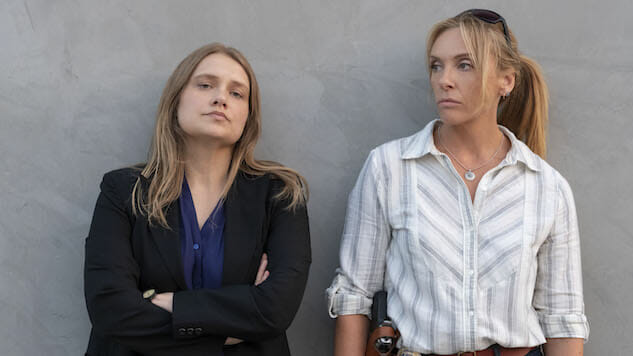Netflix’s Difficult, Exemplary Unbelievable Devastates Without Needing to Shock
Photo Courtesy of Netflix
There’s something quietly revolutionary about Unbelievable. It is difficult to watch at times, the kind of series likely to live with you long after its final moments come to a close; for a story centered on rape, that is hardly unusual. The work of its three remarkable lead actors is wonderful but also not unique; other television shows and movies have hired exceptional performers to tell these stories. Instead, “Unbelievable” distinguishes itself by the simple act of making one very big assumption: that everyone watching already knows that rape is a horrific violation. It assumes you’ve got that handled. It assumes that you’ve seen The Handmaid’s Tale or Boys Don’t Cry, or most recently, The Nightingale, and have plenty of experience seeing rape depicted in media in visceral, nightmarish fashion. It is fully aware that of the people on the other side of the screen one in six women and one in 33 men will have personally experienced a rape or an attempted rape in their lives. It has absolutely no interest in immersing its audience in trauma and violation. Unbelievable knows that you know rape is bad. It does not act as a voyeur. Under the guidance of showrunner Susannah Grant, it is far more interested in the survivor’s perspective—on what happened to her, yes, and how it lingers, but also on the violations that came after.
Based on a Pulitzer-winning piece of journalism by T. Christian Miller and Ken Armstrong (of ProPublica and The Marshall Project, respectively), Netflix’s Unbelievable is a series of such quiet power that its full impact may not come crashing down until after its conclusion. (That was certainly my experience.) The first episode begins at the Lynnwood Teen Center in suburban Washington, a home for young people transitioning out of life in the foster care system. Marie Adler (Booksmart’s Kaitlyn Dever) sits on a couch, waiting for the police to arrive, sun incongruously streaming through the windows. She prepares, for the first of many times that day, to tell someone in detail about the man in the black mask who tied her up with her own shoelaces and raped her in her home.
“Was the penetration with his penis or his fingers?” the first officer to arrive asks. He doesn’t notice, or doesn’t acknowledge, the terror in her eyes. She looks away, and replies, “Not his fingers.”
Unbelievable may not treat the violence it contains as some sort of endurance test for the audience, but it doesn’t excise it from the story either. Another piece of its quietly revolutionary approach: We see the assault almost exclusively from Marie’s perspective, terrifying slivers glimpsed beneath a blindfold, her eyes locked on a photo of herself, running joyfully into the ocean. It is deeply upsetting, but it’s the experience of a young woman being forced to relive her trauma again and again, for people who fail to see or disregard her obvious distress. Questions trigger flashes of memory. The flashes drive her further and further into herself, as she builds walls around the panic and pain. She’s had practice at that. She’s so accomplished that two of her former foster mothers—both people who love her, and both rape survivors themselves—doubt the nature of her reaction, and even the truth of her story. She’s simply too okay. One of them (Elizabeth Marvel) expresses some doubts to the investigating detective (Eric Lange), and that’s the beginning of yet another nightmare.
Unbelievable continues to follow Marie’s story, as the system continues to fail her and she spirals out of control. But in Episode 2 of the limited series, it also jumps several years into the future and several states east. Another young woman (Danielle Macdonald of Patti Cake$), another bright morning, another fleet of cop cars outside an apartment complex. But the detective who pulls up, Karen Duvall (Merritt Wever), has a very different approach.
As a dual portrait—of Marie, and of the system that fails her—Unbelievable is incredibly effective. But it’s also an excellent crime drama. Through happenstance, Duvall discovers her case is startlingly similar to another in a nearby district, one investigated by Grace Rasmussen (Toni Colette). They begin digging, uncovering more similarities and more cases, and begin the arduous task of chasing every possible lead.
-

-

-

-

-

-

-

-

-

-

-

-

-

-

-

-

-

-

-

-

-

-

-

-

-

-

-

-

-

-

-

-

-

-

-

-

-

-

-

-








































